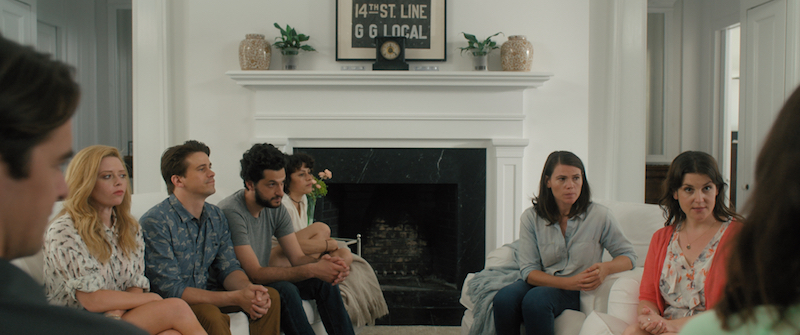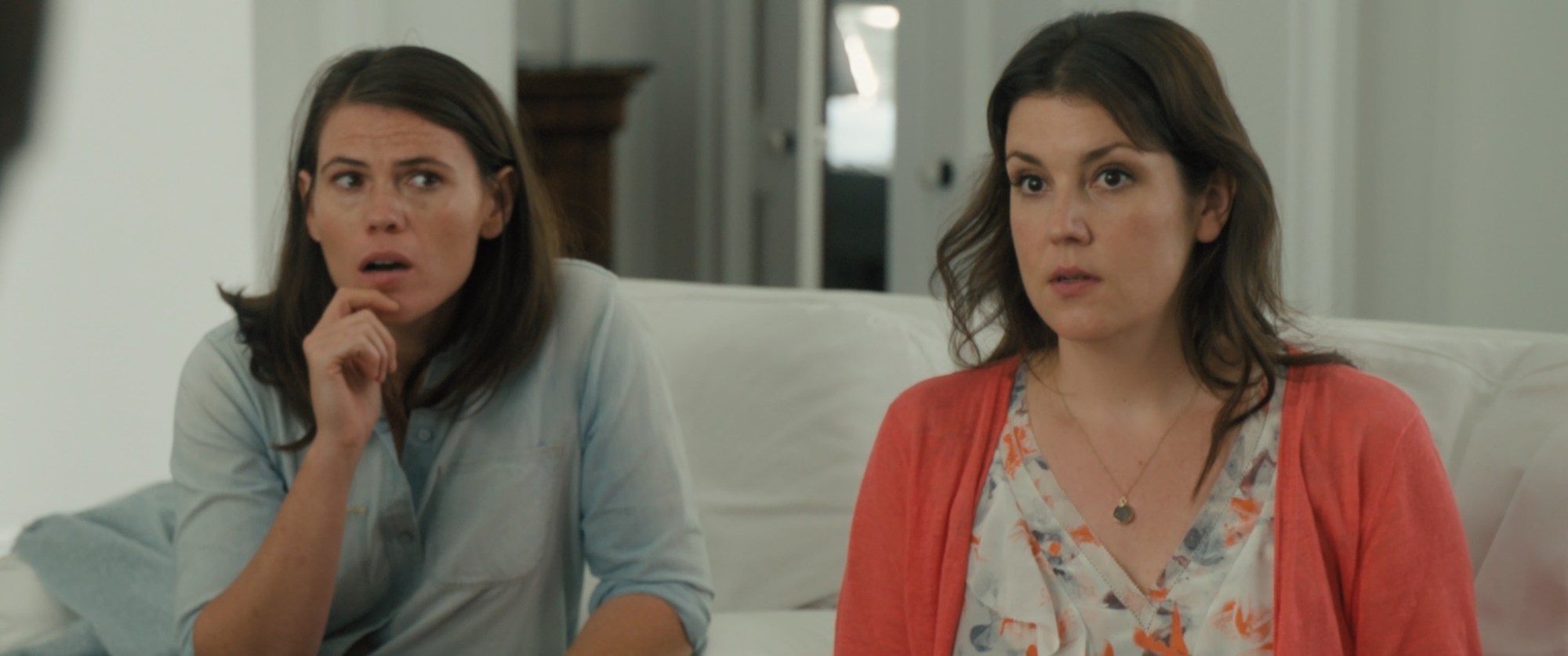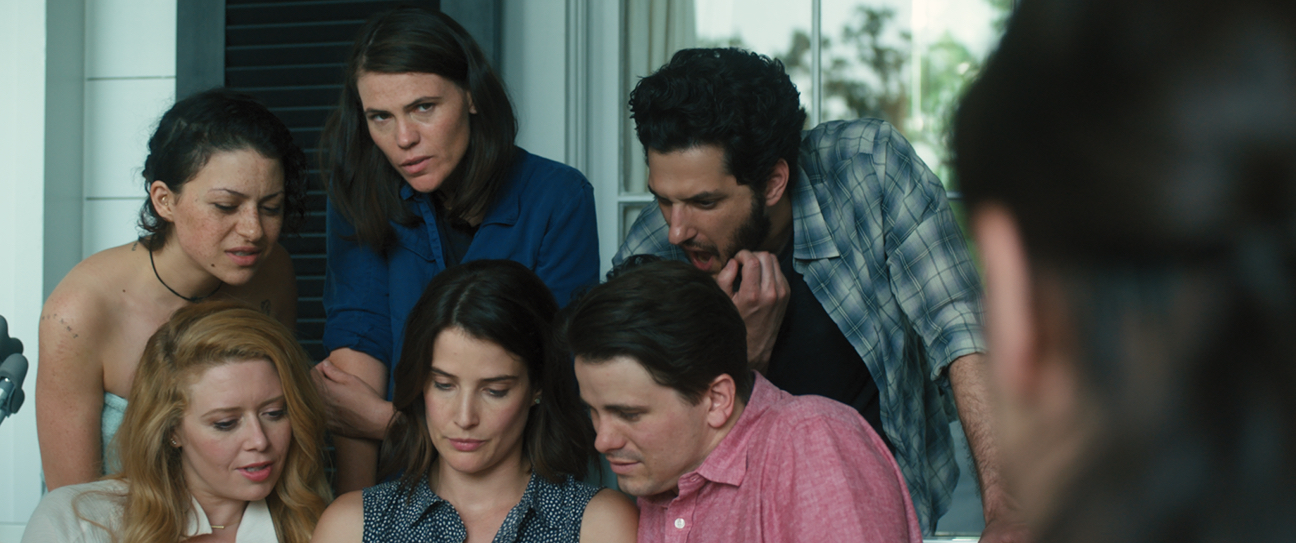In the late 90s, young director Jamie Babbit was forced to trim down her debut feature film — the radically camp teenage rom-com But I’m a Cheerleader — after the Motion Picture Association of America slapped it with a NC-17 rating. The board was particularly shocked by a fully clothed lesbian scene between the film’s central characters, Natasha Lyonne and Clea DuVall. Even the shorn-down version was dropped by Fine Line Features before being picked up by Lions Gate, who released the film to to audiences in 2000. But I’m a Cheerleader’s perfect casting, enduring political relevance, and Malibu Barbie mise-en-scène make it a highly GIFable cult favorite 16 years later.
Now Clea is making her own directorial debut with a feature that’s more madhouse than Dreamhouse. The Intervention involves three 30-something couples who arrange a weekend getaway with an ulterior motive: telling a fourth couple that they should get a divorce. Clea wrote the script for her BFF and Cheerleader co-star Melanie Lynskey, who plays Annie — a meddling alcoholic who can’t commit to a wedding date with her fiancé Matt (Jason Ritter). Clea’s character Jessie is similarly afraid of fully devoting herself to her girlfriend, Sarah, played by her Cheerleader love interest Natasha Lyonne. Also joining the ensemble are Jack (Ben Schwartz) and Lola (Arrested Development‘s Alia Shawkat) as a widowed bachelor and his bi-curious millennial girlfriend, and Cobie Smulders and Vincent Piazza as the not-so-blissfully unaware married couple. Annie’s plan to split them up goes exactly as well as you’d expect.
Much of The Intervention‘s brilliance stems from its flawless casting. It’s no surprise that this is something Clea feels particularly strongly about, having carved a career out of playing compelling, often haunting roles. There are entire Tumblr accounts and MySpace albums dedicated to her iconic, angsty 90s characters from films like The Faculty, Girl, Interrupted, and of course But I’m a Cheerleader. Clea herself has no idea that these exist. We spoke to the actor/writer/director about being unknowingly Tumblr famous, meeting Melanie at a KISS concert, and censorship of same-sex scenes on screen.

Congratulations on the release of your directorial debut. How does it feel to finally have the film showing in theaters?
Audiences seem to be enjoying it, which is cool. It’s still very surreal and nerve-racking.
How did the idea for the plot come about?
When I was making the movie, I wanted two things — I knew I wanted it to be about relationships, and I knew I wanted it to be centered around Melanie Lynskey. Then I started thinking about a person who was so delusional and so dishonest with themselves that they spent all their time thinking about other people’s lives. What if they really tried to get in there and interfere in someone else’s relationship to that extreme, and what would happen if they did? It seems like a very silly idea, and the idea of Melanie playing that character just seems like a lot of fun.
How did Natasha Lyonne end up joining the cast as Sarah?
I got to the point where we had financing, we were putting the cast together, and she just seemed like the logical choice. She’s my other best friend — Melanie and Natasha are my best friends. She and I work really well together. We were in But I’m a Cheerleader a long time ago, and have that really easy chemistry. I wanted those two characters to have a lot of familiarity and feel very comfortable with one another, and I knew that Natasha and I would have that without even trying.
But I’m a Cheerleader still has quite an intense cult following. Did it occur to you at all during The Intervention’s early stages that people would be so excited for the return of you two as an on-screen couple?
I didn’t realize that would be a big deal for people. I knew that people really loved that movie, but I wasn’t aware of how much people were really into our characters as a couple. It was fun for us to be able to work together again and to work together in that way, because But I’m a Cheerleader was such a big deal for us and our friendship. It was a really fun surprise to see that there’s a group of people out there who are really still excited to see us playing a couple again all these years later.
Did it feel weird to switch the dynamic in your relationship with Natasha from co-stars to director and actor?
It was strange. When you have a certain dynamic with someone for as long as you’ve known each other then suddenly you’re in a position where you’re kind of in charge, it’s hard to just flip the switch. I think that we got there, but I was definitely surprised by how strange it felt to be telling her, “Okay do this.”
I would love to talk about Heavenly Creatures. I’m from New Zealand and we were shown that movie in school at quite a young age. It was made five years before you worked with Melanie on But I’m a Cheerleader — what effect did her performance have on you the first time you saw it?
She was so fascinating to watch. I couldn’t take my eyes off her. They were both (Melanie and Kate Winslet] great, but I really connected with Melanie. She’s my best friend now, so it’s no surprise — I think I just saw something that was very relatable for me at the time in terms of feeling like an outsider and wanting to connect but not always knowing how, and then having that fierce connection. As a teenager, you’re figuring out how to have relationships of all kinds and what to do with those feelings. And then just as an actor, she’s so fascinating. I still feel that way. I can’t keep my eyes off her when she’s on screen.
What was it like meeting her for the first time? Was that when you started filming But I’m a Cheerleader?
No, I actually met her for the first time at a coffee shop that I worked at. She came into the coffee shop and I recognized her from Heavenly Creatures. I told her how much I loved her and gave her a free cup of coffee. That was technically the first time we met. I met her again a couple of months before we did But I’m a Cheerleader. Her and Natasha had done a movie called Detroit Rock City together, so I met Melanie at a KISS concert.
That’s amazing. What happened at the concert?
It was a really wild night that I don’t think she was really planning on being a part of. She wanted to go home but she didn’t have the keys to the place she was staying at so she was stuck with us all night. I think we saw each other maybe two or three times before we started filming But I’m a Cheerleader, then when we were making the film we got really close.
It’s almost like that’s a recurring theme in your career — seeing someone on screen then meeting them and acting alongside them. I was reading a list that you recently wrote of your most formative film-watching experiences and the first one was Beetlejuice with Winona Ryder. What was it like working with her on Girl, Interrupted after seeing her in a film that meant so much to you as a kid?
Being a part of that movie was such a huge deal for me on so many levels, including getting to meet her and work with her. She was so nice to me and really fun to work with, and worked so hard and cared so much. That was her project that she had been trying to put together for such a long time, and that was a really inspiring thing to see.

You recently started an Instagram and you’ve been on Twitter for a while. Do you ever look at internet fan tributes to your 90s cult favorite characters? There are tons of them.
No! I’m not very good at the internet. I don’t really know where to go. Unless I’m looking for something very specific on the internet, I don’t really spend a lot of time on it. Somebody else just told me about Tumblr and that there’s stuff [about me] on Tumblr, and I didn’t know and I didn’t go look.
It would probably be quite a weird experience. There’s quite a cute MySpace album dedicated to your character Wanda Ricketts from Popular, who I think was in all of two episodes.
That’s very funny!
The lack of complex roles available for female actors is still such a problem today, but you’ve managed to carve a career out of playing these multifaceted women. Do you think this is a reflection of who you were at the time?
I am definitely drawn to more complex female roles. I have never really been into playing just “the girl,” unless there’s something else going on. I think that there are actresses who are better suited to do that anyway. When I was younger I was definitely a little more brooding. As I’ve gotten older I’ve shut that, just because you grow up and the angst kind of goes away. Now I try to find the roles that I really feel like I can bring something to. If I read a script and I feel like I’m not the best person for it then I won’t do it. I’ve definitely taken on roles where I felt uncomfortable or I didn’t feel like I was the right choice. It turns out fine, but it’s not great. I really believe that casting is so important and so much of why things really work. You look at Stranger Things or The Night Of, and the casting on those shows is just so stellar, and that is why it works.
Obviously we have come a long way regarding same-sex relationships on screen since But I’m a Cheerleader. But then you hear of things like Delta censoring Carol on airplanes. How do you approach Hollywood homophobia as a director?
Things have changed a lot since But I’m a Cheerleader. There has been a world of difference made. But it doesn’t mean that people need to stop worrying about it. It’s still something that people have to be conscious of — all types of diversity in film and television. It’s something that, as a filmmaker, I want to work for more. I want to have a more diverse group with me on my next project. That’s the world that we live in and it’s a misrepresentation when you don’t have all different kinds of people in things. Whether it’s same-sex relationships or trans characters — because it isn’t the quote-unquote “norm,” you do have to make a conscious decision to bring it in and allow the world to be as diverse as it really is, and not just what people are used to seeing. Yes, I think that we’ve come far, but there’s still a way to go. It’s on people’s minds, and I think that is the first step.
So you definitely want to do more writing and directing in the future?
Oh yeah. I would love to write and direct another movie. I would love to work on a movie that I didn’t write. Because as an actor you do so many different projects — you do film, you do TV, you do so many different genres, and that’s something that I’ve always really enjoyed in my career as an actor. That’s something that I would like to also have in my career as a writer and a director.
Credits
Text Hannah Ongley
Images courtesy of Samuel Goldwyn
